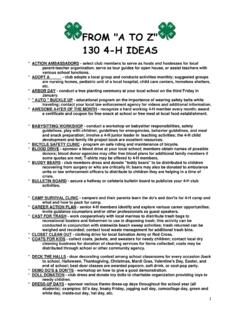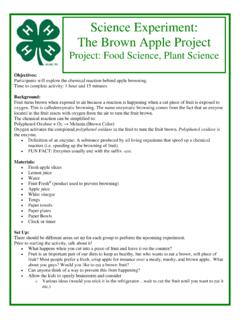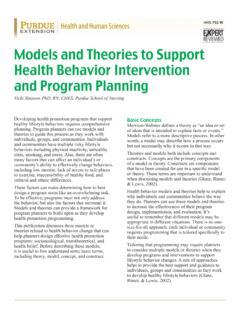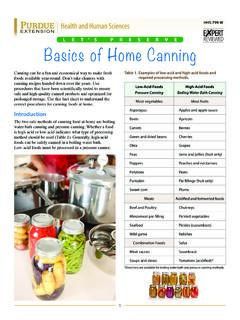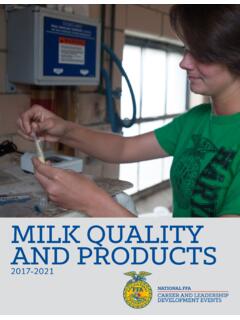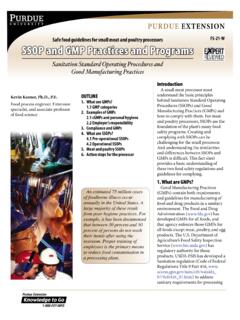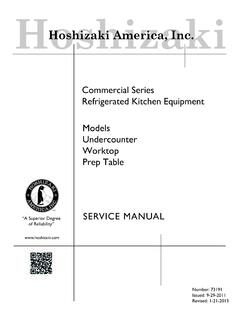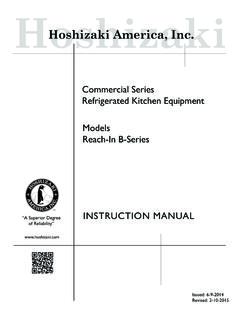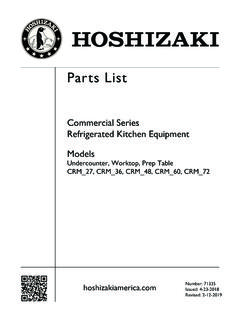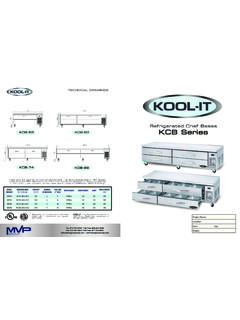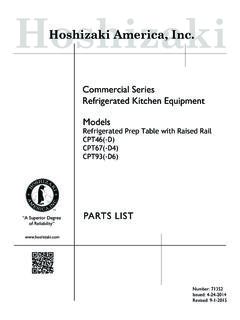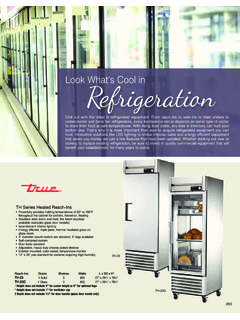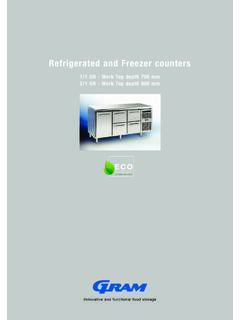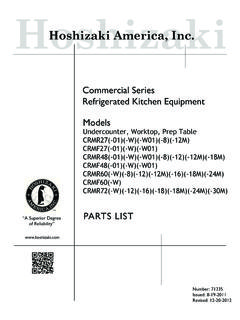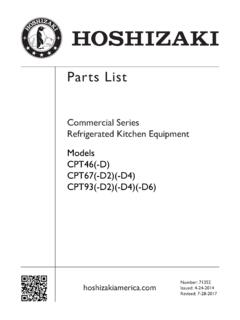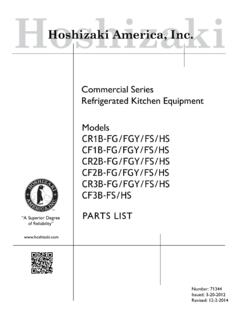Transcription of Using an Approved Kitchen to Prepare Food for Sale ...
1 Purdue extension FS-17-W. food Entrepreneurship series Using an Approved Kitchen to Prepare food for Sale Department of food Science food entrepreneurs have two ways to produce foods for sale to consumers in Indiana. Some limited types of foods can be produced in a home Meat, poultry, egg, and dairy processing Kitchen if those foods qualify under the home- operations must comply with completely Katherine Clayton based vendor rule (see Using a Home Kitchen different sets of regulations. Please refer to food science Extension to Prepare food for Sale, Purdue Extension Regulations for Indiana food Processing outreach specialist publication FS-18-W). But entrepreneurs who (Purdue Extension publication FS-16-W) for wish to sell foods that don't qualify for this more information.
2 Deidre Bush former Extension assistant exemption will need to work with an Approved Kitchen facility. Kevin Keener Approved Facilities for a food process engineer, Where does an Indiana entrepreneur find an Extension specialist, and Approved Kitchen facility to produce the food Small-Scale food Business professor of food science product they wish to sell? That depends on the Restaurants, camps, schools, inspected church type of food product and the selling location. kitchens, and retirement homes are some examples of Kitchen facilities that may be Entrepreneurs who want to market to a larger available for short-term, small-scale production customer base with a wider variety of products Department of food Science of wholesale food products.
3 An entrepreneur may than the home-based vendor exemption allows 745 Agriculture Mall Drive want to talk with local caterers, the local chamber must manufacture their products in an Approved West Lafayette, IN 47907 of commerce, or the Indiana State Department facility separate from a home Kitchen . An of Health for a list of businesses that might be Approved facility is one that is inspected either by available for use. An entrepreneur should verify the Indiana State Department of Health (ISDH) or with the local health department that any facility by one of the 93 local health departments (www. considered for use meets all sanitation and ). Retail food businesses not on state property are inspected by the local county health department.
4 Retail food businesses on state property and food wholesalers are inspected by the ISDH. Retail food sales are those sold directly to a consumer by the processor or distributor, such as at restaurants, grocery stores, festivals, fairs, and carnivals, and through Internet sales. A food wholesaler, as defined by the ISDH, is any business that manufactures, packages, repackages, or transports human food for distribution to another entity for resale or redistribution. This excludes residential kitchens and bed-and-breakfast operations. FS-17-W food Entrepreneurship series . Using an Approved Kitchen to Prepare food for Sale Purdue extension 2. health requirements. If the facility is to be used for wholesale production, it is recommended that the entrepreneur contact the Indiana State Department of Health food Protection Program (http://www.)
5 To discuss the intended use. Additional food -Production Options for Entrepreneurs Community kitchens, commercial kitchens, or incubator kitchens are a popular option for entrepreneurs starting a food business. These kitchens are set up so that numerous starter businesses can use the facilities. There is usually a Kitchen manager, and a wide variety of foods can be processed, depending on the equipment available. Each Kitchen has its own payment structure for Preparation of food products for sale to the public Kitchen usage time and storage costs. must be done under sanitary conditions. Another option for entrepreneurs to produce a Storing Ingredients and product is working with a co-packer, which is Finished Product a commercial producer who regularly produces Other factors that might affect selection of a food - a similar product and is available for contract production facility are the storage of ingredients and production.
6 Co-packers typically have larger of the finished product. Regulations require that once processing and packaging capabilities and may be an ingredient package is opened, it must be kept in able to assist in identifying ingredient sources. A list the facility of production. Keep in mind that the type of commercial kitchens and co-packers can be found of ingredients ( , dry, refrigerated , or frozen) and at the amount of space required for each ingredient Training on the use of equipment, cleaning, waste because space may be limited or costly. Storing only disposal, and storage of finished products should one day's ingredients may be preferable to long-term all be taken into consideration when writing an storage.
7 Agreement. All ingredients should be obtained from sources that A certified food handler must be employed at most comply with applicable state and federal statutes food establishments. The certified food handler does and regulations, and with local ordinances. Raw not have to be on site at the time of production, materials and other ingredients should be inspected but this person is responsible for all operations and segregated as necessary to ensure that they at the food establishment ( are clean and suitable for processing into food . ). If no employee is certified, the Finally, separation of raw and cooked or finished entrepreneur may need to become certified. product is very important in ensuring safety of the Numerous exemptions exist for the certified food final product.
8 Based on storage availability and cost, handler requirement based on menu items or it may be best for a finished, packaged product to be business classification ( , nonprofit). For more warehoused away from the production location. information, please see the frequently asked questions found here: Type of food Product Certain food products will have specific regulation Wholesale food establishments must register with requirements ( , standards of identity, inspection the state health department 30 days before starting requirements, etc.). Always check with your local business, but there is no fee. Retail operations health department or the food Protection Program at usually need a license or permit from the county the Indiana State Department of Health (http://www.)
9 Health department, most of which do require a fee. ) before proceeding. The Indiana State Board of Animal Health (www. ) is the regulatory agency involved with FS-17-W food Entrepreneurship series . Using an Approved Kitchen to Prepare food for Sale Purdue extension 3. any meat, poultry, and dairy products sold within References Indiana. Indiana State Department of Health Acidified and low-acid foods can be processed only food Handler Certification, under the supervision of a person who has attended (accessed October 2011). a Better Process Control School and has a scheduled process, prepared by a process authority, for the food Protection Program, foods produced. A co-packer manufacturing facility (accessed October 2011).
10 Often is used for these types of products. The facility, Local health departments in Indiana, product, and scheduled process must be filed with (accessed October 2011). the food and Drug Administration (FDA) via a Indiana Board of Animal Health Form 2541. For more information, see Regulations for Indiana food Processing, Purdue Extension food Safety and Inspection, publication FS-16-W. (accessed October 2011). Allergens and food Processing Many people have food allergies that can lead to serious illness or even death, so proper labeling and ingredient handling by a food processor is critical. Allergens are naturally occurring proteins in some foods that can cause abnormal responses of the immune system.
